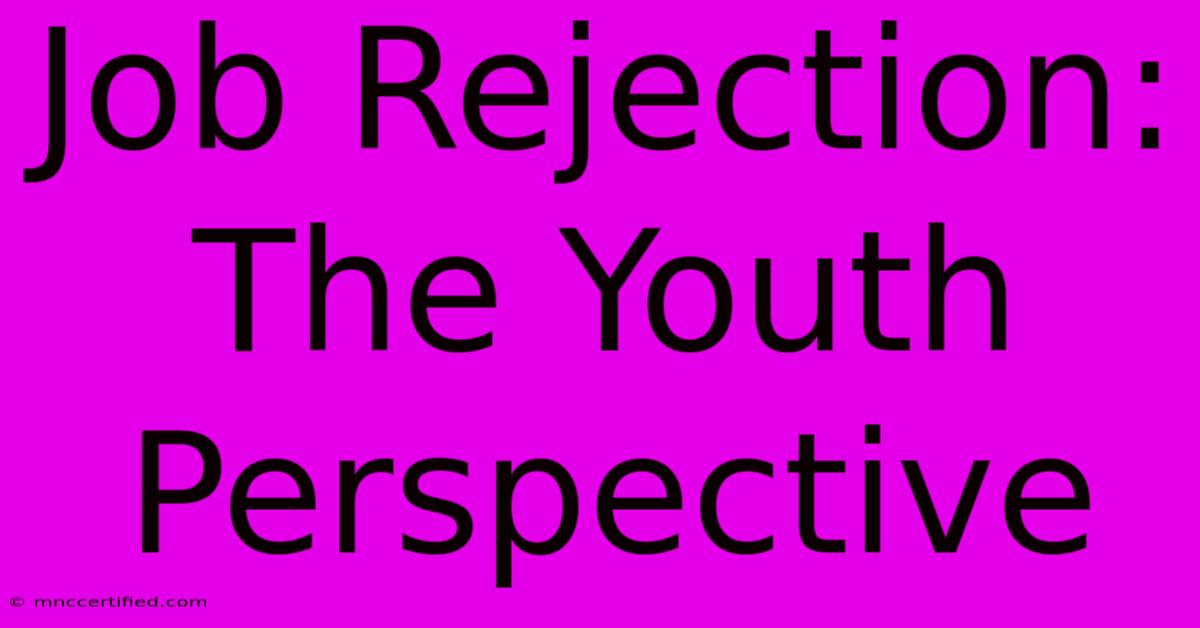Job Rejection: The Youth Perspective

Table of Contents
Job Rejection: The Youth Perspective – Navigating the Early Career Hurdles
The job hunt. For young adults entering the workforce, it's often a rollercoaster of hope, excitement, and, inevitably, rejection. This article delves into the unique challenges young people face when encountering job rejection, offering advice and strategies for navigating this difficult but crucial phase of career development. We'll explore the emotional impact, common causes of rejection, and practical steps to build resilience and ultimately find success.
The Emotional Toll of Job Rejection
Rejection stings. For young professionals, it can be particularly disheartening. The lack of experience, the intense competition, and the pressure to secure that first role can amplify the feelings of disappointment, frustration, and even self-doubt. It’s crucial to acknowledge these emotions and understand that they are normal. Feeling discouraged is a natural response, not a sign of failure.
Beyond the Rejection Letter: Understanding the Impact
The emotional impact extends beyond immediate disappointment. Repeated rejection can erode confidence, leading to:
- Self-esteem issues: Constant setbacks can fuel negative self-perception and undermine belief in one's abilities.
- Increased anxiety: The fear of further rejection can create anxiety about future job applications and interviews.
- Loss of motivation: The relentless cycle of applying, interviewing, and being turned down can be draining and demotivating.
Common Reasons for Job Rejection (From a Youth Perspective)
While a lack of experience is a frequently cited reason, it's not the only factor. Young job seekers often face rejection due to:
- Insufficient practical experience: The gap between academic qualifications and real-world skills can be significant.
- Inadequate networking: Building professional connections is vital, but often overlooked by younger applicants.
- Resume and cover letter weaknesses: These crucial documents need to highlight relevant skills and accomplishments effectively.
- Interview skills gaps: Nerves, lack of practice, or poor communication can derail even the most qualified candidate.
- Unrealistic expectations: Setting overly ambitious goals early in one's career can lead to disappointment.
- Competition: The job market is fiercely competitive, regardless of age or experience.
Turning Rejection into Resilience: Practical Strategies for Success
Job rejection is a learning opportunity. Instead of viewing it as a setback, focus on extracting valuable lessons and building resilience:
1. Analyze and Improve:
- Honest self-assessment: Review your resume, cover letter, and interview performance. Identify areas for improvement. Seek feedback from trusted mentors, career counselors, or professors.
- Target your applications: Focus on roles that truly align with your skills and interests. Tailor your application materials to each specific job.
- Develop your interview skills: Practice answering common interview questions, and consider seeking professional coaching.
2. Expand Your Network:
- Networking events: Attend industry events, career fairs, and workshops to connect with professionals in your field.
- Informational interviews: Reach out to people working in your desired field for informational interviews to gain insights and build connections.
- Online platforms: Utilize LinkedIn and other professional networking sites to connect with potential employers and mentors.
3. Build Your Skills and Experience:
- Internships: Gain practical experience through internships or volunteer work.
- Freelancing: Take on freelance projects to build your portfolio and demonstrate your skills.
- Online courses: Upskill through online courses to enhance your qualifications and make yourself a more competitive candidate.
4. Maintain a Positive Mindset:
- Celebrate small wins: Acknowledge and celebrate your progress, no matter how small.
- Practice self-care: Prioritize your physical and mental well-being. Exercise, eat healthy, and engage in activities you enjoy.
- Seek support: Talk to friends, family, or mentors for emotional support and guidance.
The Long View: Persistence Pays Off
The early stages of a career are challenging. Rejection is inevitable, but it doesn’t define your potential. By embracing a growth mindset, actively learning from each experience, and persistently pursuing your goals, you can overcome the hurdles of job searching and build a successful career. Remember, perseverance is key. Your first job is not your only opportunity.
Keywords: Job rejection, youth unemployment, early career, job hunting, interview skills, networking, resume writing, cover letter, career advice, resilience, mental health, job search strategies, overcoming rejection, young professionals, first job, career development.

Thank you for visiting our website wich cover about Job Rejection: The Youth Perspective. We hope the information provided has been useful to you. Feel free to contact us if you have any questions or need further assistance. See you next time and dont miss to bookmark.
Featured Posts
-
Top 5 Primetime Moments 2024 Rewind
Dec 24, 2024
-
Nordstrom Acquisition Family And Liverpool
Dec 24, 2024
-
Hilltop Honey The Factory Journey
Dec 24, 2024
-
Jacobs Back Among Nfls Top Rbs
Dec 24, 2024
-
Anunoby Knicks Extend Winning Streak
Dec 24, 2024